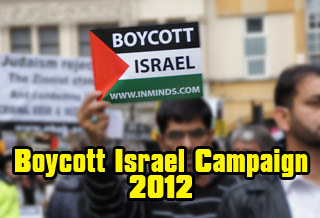
 Innovative Minds © 2014. All Rights Reserved. www.inminds.co.uk | |
Boycotting Israel: the pros and consIan Black In the bad old days, the boycott that mattered in the Middle East was the Arab boycott of Israel. No longer. Peace treaties with Egypt and Jordan, the Oslo accords with the Palestine Liberation Organization and world trade rules have left it a shadow of its former self: At a conference in Damascus last year, Arab League officials lamented that it was close to collapse. Now the boycott is being given a new lease - and new forms - of life, not by Arab governments but by non-state actors from Canada and Norway to South Africa and Ireland. It has been tried in France and Italy. But these days it is the United Kingdom that is in the vanguard and at the heart of furious controversy. Unison, the UK's largest trade union, is backing a total boycott - economic, cultural, academic and sporting - of Israel because of its occupation of Palestinian territories. University academics (the UCU) and journalists (NUJ) are considering or launching their own campaigns, generating high-octane debate and counter-campaigns by the Israeli government and supporters. Opposition to the war in Iraq and mounting sympathy for the plight of the Palestinians are common to most European countries. So why does Britain seem to be a special case? Its past role in the region is one answer. So is the triumph of English as the language of globalization. Attitudes toward anti-Semitism may be another, though boycott campaigners hotly deny being anti-Semites. Steven and Hilary Rose (themselves Jews), who pioneered the academic boycott in 2002, call it "grotesquely hyperbolic" to compare measures against Israel with the Nazi boycott of Jewish shops. "If the supporters of the Israeli government cannot distinguish between being opposed to Israeli state policy and being anti-Semitic, it is scarcely surprising that real anti-Semites conflate the two," they argue. Still, counter their critics, sensitivity to perceptions of anti-Semitism may be weaker in Britain than in continental Europe. (The UK, unlike Germany, France and Austria, does not outlaw Holocaust denial.) Yet a recent poll of British opinion formers for a pro-Israeli group showed that while 38 percent believed boycotters were anti-Semitic, 62 percent did not. This suggests that even opponents accept at face value the campaigns' goal of ending the occupation of the Palestinian territories: Their objections are on grounds of fairness and effectiveness (punishing one group for the actions of their government, reinforcing a siege mentality, strengthening the political right in Israel); and selectivity-exceptionalism (why the exclusive focus on Israel and no boycott of Sudan, China, Iran or Zimbabwe?). Conventional wisdom has it that boycott campaigns in the UK are driven by a "politicidal" alliance of far-left and Muslim organizations. In fact, the main proponents are academics and trade unionists linked to groups such as the veteran and well-organized Palestine Solidarity Campaign, and newer ones such as Jews for the Boycotting of Israeli Goods and the British Committee for Universities of Palestine. Another significant factor is the success in Britain of the campaign against apartheid where boycotts, sanctions and disinvestment played a major role. "Universities are to Israel what the Springboks were to South Africa: the symbol of their national identity," in the words of one UCU activist. Much hinges on whether a distinction is made between Israel in its pre-1967 borders and the territories - the nub of the argument between a two-state and a one-state solution to the conflict. If it is, it is logical to boycott the College of Judea and Samaria in Ariel or to target the produce of settlements beyond the pre-1967 border, or "green line." Opposition to the Iraq war and dislike for Tony Blair's subservient relationship with US President George W. Bush have merged with the "root causes" view that more must be done to achieve a just solution of the Israeli-Palestinian conflict, both for its own sake and to defuse Muslim resentment over perceived double standards. This is a debate in which "it's Western foreign policy, stupid" is posited against the claim that "Muslims hate our values and freedoms." Yet perceptions of Israel were changing long before the pivotal moment of the 9/11 attacks: The route from David to Goliath after 1967 is a familiar one, through the 1982 war in Lebanon, the first intifada and the narrative shift by Israel's "revisionist" historians. Daphna Baram traced this process in her study of coverage in The Guardian of Israel, succinctly entitled "Disenchantment." Disenchantment for some is demonization and de-legitimization for others. The debate over Israel's "security barrier" or "apartheid wall" and this year's 40th anniversary of the 1967 war have been galvanizing factors too. Beyond the specifics of the Israel-Palestine conflict, the boycott phenomenon reflects a shift to political activism by citizens who see themselves as members of global civil society struggling to achieve what powerful governments and multinational corporations cannot or will not do. Environmental and anti-globalization campaigns are fueled by the same impulses. And so the boycott-backlash debate rages on. The NUJ decision is being challenged by some of the union's own members, myself included: My view is that the creation of an independent and viable Palestinian state alongside Israel is an existential (and increasingly urgent) need for both peoples, but that blanket boycotts will not help achieve that goal. And leaving politics aside, what am I as a journalist to say to the Israeli (or Sudanese, Chinese, Iranian or Zimbabwean) I want to interview, but who replies: "I won't talk to you if your union is boycotting my country"? Ian Black is the Middle East editor of The Guardian. This commentary first appeared at bitterlemons-international.org, an online newsletter. Source: http://www.dailystar.com.lb/article.asp?edition_id=10&categ_id=5&article_id=83630 Also Of InterestPage URL: http://inminds.com/article.php?id=10161
|
|
Support Us
If you agree with our work then please support us.Campaigns INMINDS Facebook Live Feed Latest Video's
INMINDS Twitter Feed Tweets by @InmindsComFeatured Video's
You need Flash player 8+ and JavaScript enabled to view this video.
[all videos (over 200)..] Featured MP3 Podcast  "Samina Malik, the first woman to be convicted under the terrorism act. Now what was Samina guilty of? Did she blow anything up? No. Was she caught by the police with a big cache of explosives? No. Was she caught tying a suicide belt around her waist? No. So what did Samina do? She wrote some poetry.. Now you contrast this with another case about 6-7 months ago of some former members of the BNP - that white fascist supremesist organization - Robert Cottage and David Jackson both who were caught with the biggest cache of explosives in the West Yorkshire region with notes about assassinating Tony Blair and talking about blowing up Mosques around the UK with plans and blue-prints for those Mosques. They weren't even charged under the Terrorism Act!" Islamic Human Rights Commission Islamic Human Rights Commission 10th Anniv. Nov 2007 [13min / 6Mb] [all podcasts..] Newsletter Feedback |
 |
 |













































